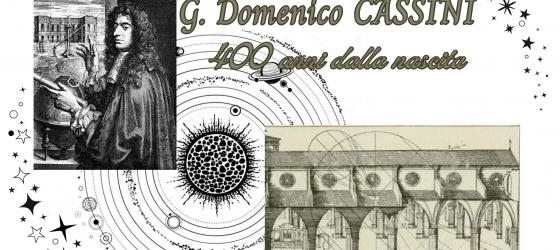At the Library, we periodically set up a “thematic showcase” where we display books and documents from our heritage related to a theme or anniversary. For the month of June 2025, we have chosen the 400th anniversary of the birth of Giovanni Domenico Cassini
Giovanni Domenico Cassini was born on 8 June 1625 in Perinaldo, in the province of Imperia. He was a student in Genoa and then Reader of Astronomy in Bologna, where he was later hired as professor of astronomy at the age of only 24. From his beginnings in Bologna, Cassini appeared as a man of great commitment. He designed instruments for astronomical observations and built a new meridian line in the church of San Petronio, which to this day is the longest in the world. Using his sundial he was able to conduct research on the apparent slowing of the Sun's course in summer, the obliquity of the ecliptic, solar parallax, atmospheric refraction and the apparent diameter of the Sun. His results unequivocally defeated Aristotle's celestial mechanics based on uniform circular motions. Cassini's skills were such that he also held important engineering positions as superintendent of water and fortifications for the Papal States. The fame he acquired was such that the scientific and political authorities of several cities invited him to give them prestige by carrying out new astronomical observations on site. In 1665 he discovered the axial rotation of Jupiter, calculating its velocity, and the following year that of Mars. He discovered the dark band in Saturn's rings, known as the Cassini Division, showing that the rings were composed of multiple fragments.
n 1669 he arrived in Paris, invited by King Louis XIV to direct the new Observatory. Here he developed a mount for telescopes and telescopes equipped with a clockwork system and calculated the distance of Mars from the Earth and then that of the Earth from the Sun. What was supposed to be a short stay soon turned into a life choice: he stayed in Paris. There he coordinated the observations of the group of mathematicians, astronomers and geographers of the Académie des sciences. He died on 14 September 1712.
curated by Serena Ratti and Roberta Scordamaglia - CAeB
The list of books exhibited in the Thematic Showcase:
Fondamenti di astronomia / Hannu Karttunen ... [et al.] ; a cura di Andrea Cimatti, Paola Focardi
The sun from space : Kennet R. Lang
Fundamental astronomy / Hannu Karttunen
Dalle stelle all'universo : lezioni di astrofisica / Alessandro Braccesi
Pianeti e teorie del cielo nel Settecento / Francesca Maria Crasta
